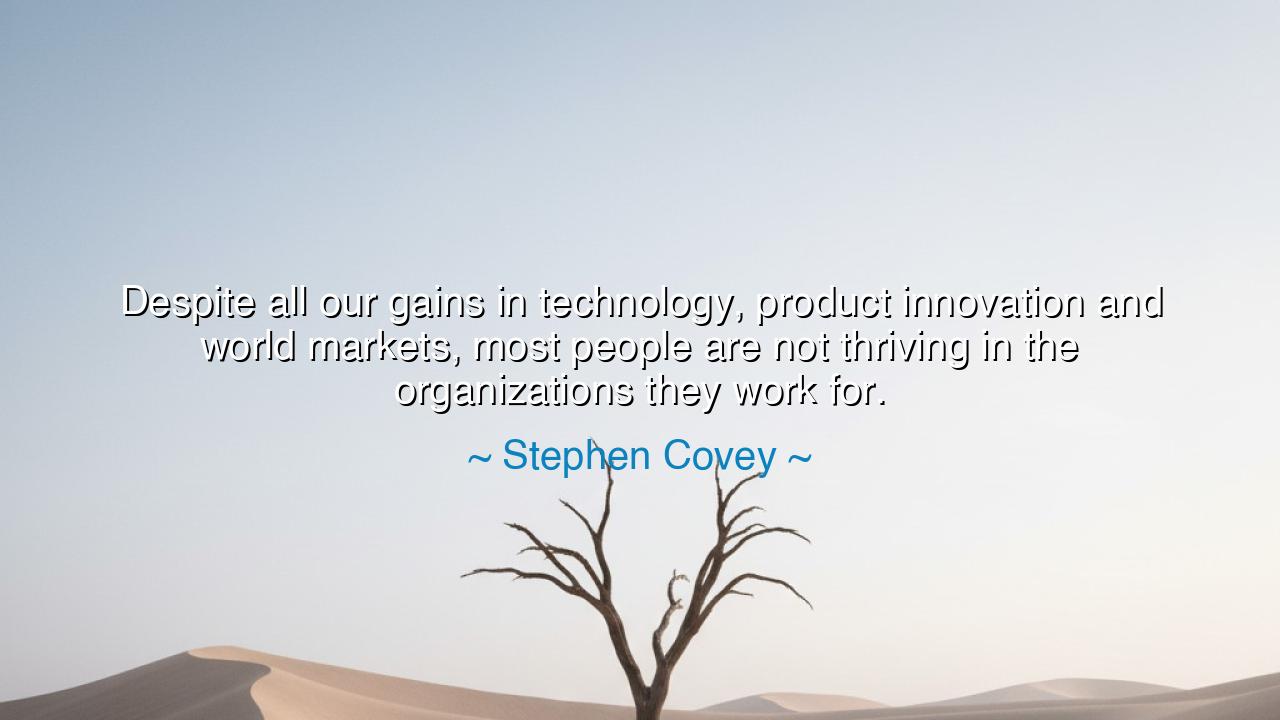
Despite all our gains in technology, product innovation and
Despite all our gains in technology, product innovation and world markets, most people are not thriving in the organizations they work for.






Hear, O seekers of balance in work and life, the voice of Stephen Covey, teacher of principles and guide to leaders, who declared: “Despite all our gains in technology, product innovation and world markets, most people are not thriving in the organizations they work for.” In this statement lies both triumph and tragedy—the triumph of human progress in tools, inventions, and trade, and the tragedy that amidst such abundance, the human spirit within organizations remains hungry and unfulfilled.
For technology has leapt forward like a fire across the earth. Machines perform in seconds what once demanded days. Product innovation has flooded the markets with wonders, from medicine that heals the incurable to devices that connect voices across oceans. And world markets have bound nations into a single web of commerce, allowing goods and knowledge to flow with a speed our ancestors never imagined. Yet, as Covey laments, these victories of progress have not translated into victory for the worker’s heart. Many labor not with joy, but with weariness; not with purpose, but with resignation.
To thrive is more than to earn wages; it is to grow, to flourish, to feel that one’s labor matters in the great design of life. Covey reminds us that despite abundance, too many remain trapped in organizations that prize efficiency above meaning, profits above people. It is as if humanity has built palaces of gold but left the builders dwelling in shadows. This truth has echoed through ages: external wealth without inner fulfillment breeds unrest, alienation, and despair.
Consider, O listener, the rise and fall of the Roman Empire. Rome conquered vast lands, innovated in roads, aqueducts, and governance, and its markets bustled with wealth. Yet within, many citizens felt enslaved not only by chains but by a loss of dignity in labor. Gladiators thrilled the crowds, but their spirits withered. Soldiers brought treasures home, but peasants struggled to thrive. Rome’s outward gains masked its inner decay, and in time, the imbalance led to its downfall. Covey’s words echo this warning: without thriving people, no organization—no empire—can endure.
There are also examples of hope. When leaders choose to honor people over mere systems, flourishing follows. Consider the Quaker-run companies of the Industrial Revolution, such as Cadbury and Rowntree, who sought not only profit but the well-being of their workers. They built schools, housing, and communities, and their workers thrived as whole human beings, not mere cogs in a machine. Their success was proof that when people are valued, both organization and society prosper together.
The wisdom of Covey’s words is thus clear: progress in tools is meaningless without progress in humanity. Technology can amplify human potential, but it cannot replace human dignity. Innovation can craft marvelous products, but it cannot supply purpose. Markets can connect the world, but they cannot create belonging. These must be cultivated intentionally within organizations that see people not as resources, but as souls.
Therefore, O child of tomorrow, take this teaching into your heart: seek not only to work, but to thrive. And if you are a leader, remember that your true success is not measured in profits alone, but in the flourishing of those entrusted to your care. Build organizations where people grow, where their gifts are honored, and where their labor serves a vision greater than wealth. For in such places, humanity will find its true abundance—progress not just of machines, but of the spirit.






AAdministratorAdministrator
Welcome, honored guests. Please leave a comment, we will respond soon